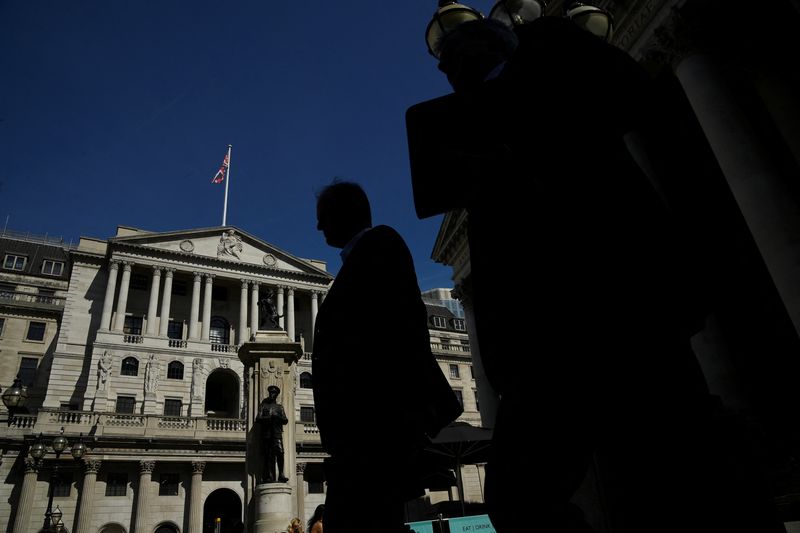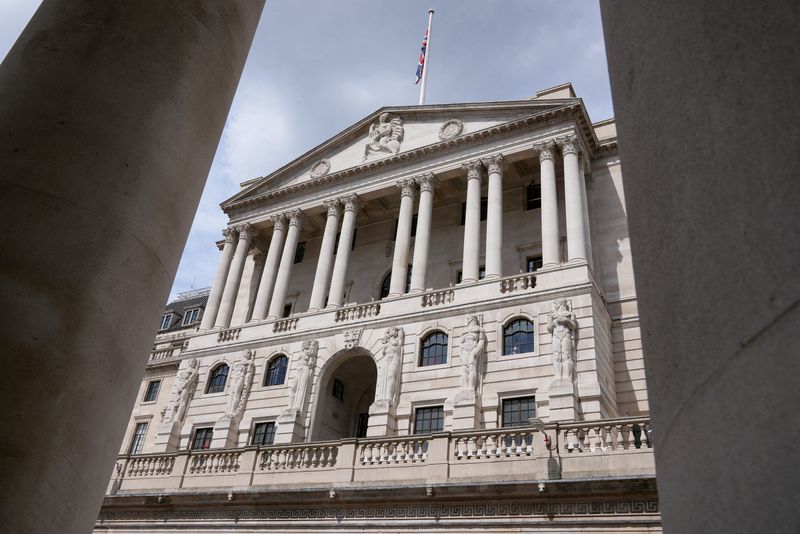By David Milliken and Farouq Suleiman
LONDON (Reuters) - The Bank of England raised its key interest rate by half a percentage point to 2.25% on Thursday and said it would continue to "respond forcefully" to inflation as needed, even though the British economy is probably in a shallow recession already.
The central bank cut its forecast for the peak in inflation to just under 11% from more than 13%, following Prime Minister Liz Truss's plan to cap energy prices, but warned that the policy could create longer-term price pressures.
Just hours after the BoE decision, new finance minister Kwasi Kwarteng said a promised cut in payroll taxes would take effect from Nov. 6. He is due to make a fiscal statement to parliament on Friday outlining policies that economists think could cost more than 150 billion pounds ($169 billion).
Such government spending, likely to be largely funded by new borrowing, is a double-edged sword for the BoE, reducing the chances of the prolonged recession the central bank forecast last month, but adding to the forces pushing up inflation.
The BoE said economic prospects in the very near term had deteriorated, in part due to this week's extra public holiday to mark Queen Elizabeth's funeral. Gross domestic product for the July to September quarter is now expected to shrink 0.1%, compared with a previous BoE forecast for 0.4% growth.
Combined with a fall in output in the three months to June, these two successive quarters of contraction meet the common definition of a technical recession.
The BoE was the first major central bank to start raising interest rates in the current tightening cycle. But it has recently fallen behind the pace set by the U.S. Federal Reserve, which raised rates on Wednesday by three quarters of a percentage point, pushing sterling to a 37-year low against the U.S. dollar.
"Though commenting on the exchange rate remains taboo for many of the MPC, we suspect there will be concern about the inflationary consequences of a further weakening of the pound," said Andrew Goodwin, chief UK economist at Oxford Economics.
Sterling fell against the dollar after the decision but stayed above the historic low close to $1.12 hit earlier in the day.
Economists polled by Reuters last week had forecast a repeat of August's half-point increase in rates, but financial markets had bet on a three-quarter-point rise, the biggest since 1989, apart from a brief, failed attempt in 1992 to support sterling.
British government bond prices fell sharply, but investors slightly pared back their expectations for rate rises. Futures show BoE interest rates reaching 3.5% by the end of the year - a quarter point lower than before the decision - though they continue to price in rates reaching 5% in mid-2023.
As usual, the BoE gave little steer on how much it was likely to raise rates in the coming months.
"Should the outlook suggest more persistent inflationary pressures, including from stronger demand, the Committee will respond forcefully, as necessary," the BoE said, using a similar form of words to previous months for its policy intentions.
GRAPHIC-Bank of England under pressure
https://graphics.reuters.com/BRITAIN-BOE/jnpwemmkepw/chart_eikon.jpg
SPLIT COMMITTEE
The BoE's Monetary Policy Committee voted 5-4 to raise rates to 2.25%. Deputy Governor Dave Ramsden and external MPC members Jonathan Haskel and Catherine Mann voted for a bigger increase to 2.5%, while new MPC member Swati Dhingra wanted a smaller rise to 2%.
The MPC also voted unanimously to reduce the BoE's 838 billion pounds of government bond holdings by 80 billion pounds over the coming year, by continuing to let bonds mature and through active sales, which will start next month.
This is in line with the goal it stated in August, and makes the BoE the first major central bank to start selling off the bonds bought during more than a decade of quantitative easing.
British consumer price inflation hit a 40-year high of 10.1% in July and dropped to 9.9% in August. The BoE said it expected inflation to remain above 10% for several months after its October peak.
In a scheduled letter to new finance minister Kwasi Kwarteng, explaining why inflation was so far above the BoE's 2% target, Governor Andrew Bailey said Russia's invasion of Ukraine was a major cause, but an unexpectedly tight domestic labour market was another factor.
British unemployment fell to its lowest since 1974 in the three months to July at 3.6%.
On Friday, Kwarteng will give more detail about the government's fiscal plans, likely to include scrapping a previously planned rise in corporation tax, as well as costings for household and business energy subsidies.
"All else equal ... this will add to inflationary pressures in the medium term," Bailey told Kwarteng about the household cap, adding the BoE would assess other measures in November.

Kwarteng said the government's efforts to support growth would increase the economy's room for non-inflationary expansion.
($1 = 0.8872 pounds)
